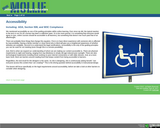
Accessibility in Online Learning
- Subject:
- Education
- Material Type:
- Activity/Lab
- Reading
- Provider:
- AEA
- Provider Set:
- OLLIE
- Author:
- Evan Abbey
- Date Added:
- 12/03/2018

Accessibility in Online Learning

Sample module from Alabama A&M University
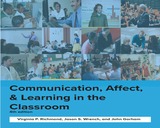
This book is an introduction to communication, affect, and learning in the classroom. The book was originally created as a way to introduce K-12 educators to instructional communication, but has been expanded to help College/University professors and Talent Development professionals as well.
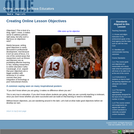
Creating Online Learning Objectives
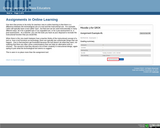
Developing Online Assignments

Diversity: the art of thinking independently together. —Malcolm Forbes, entrepreneur, founder of Forbes magazineLEARNING OBJECTIVESBy the end of this section, you will be able to:Define diversity and identify many aspects of diversityDifferentiate between surface diversity and deep diversity, and explain the relationship between the twoDefine and apply principles of cultural competencyExplore the positive effects of diversity in an educational setting
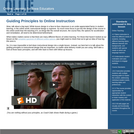
Guiding Principles to Online Instruction
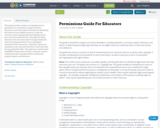
This guide provides a primer on copyright and use permissions. It is intended to support teachers, librarians, curriculum experts and others in identifying the terms of use for digital resources, so that the resources may be appropriately (and legally) used as part of lessons and instruction. The guide also helps educators and curriculum experts in approaching the task of securing permission to use copyrighted materials in their classrooms, collections, libraries or elsewhere in new ways and with fewer restrictions than fair use potentially offers. The guide was created as part of ISKME's Primary Source Project, and is the result of collaboration with copyright holders, intellectual property experts, and educators.
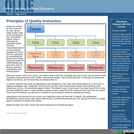
Principles of Quality Instruction

Psychology is designed to meet scope and sequence requirements for the single-semester introduction to psychology course. The book offers a comprehensive treatment of core concepts, grounded in both classic studies and current and emerging research. The text also includes coverage of the DSM-5 in examinations of psychological disorders. Psychology incorporates discussions that reflect the diversity within the discipline, as well as the diversity of cultures and communities across the globe.Senior Contributing AuthorsRose M. Spielman, Formerly of Quinnipiac UniversityContributing AuthorsKathryn Dumper, Bainbridge State CollegeWilliam Jenkins, Mercer UniversityArlene Lacombe, Saint Joseph's UniversityMarilyn Lovett, Livingstone CollegeMarion Perlmutter, University of Michigan
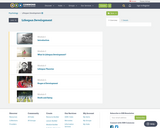

By the end of this section, you will be able to:Discuss Freud’s theory of psychosexual developmentDescribe the major tasks of child and adult psychosocial development according to EriksonDiscuss Piaget’s view of cognitive development and apply the stages to understanding childhood cognitionDescribe Kohlberg’s theory of moral development
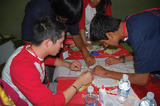
By the end of this section, you will be able to:Describe the stages of prenatal development and recognize the importance of prenatal careDiscuss physical, cognitive, and emotional development that occurs from infancy through childhoodDiscuss physical, cognitive, and emotional development that occurs during adolescenceDiscuss physical, cognitive, and emotional development that occurs in adulthood
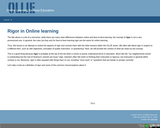
Rigor in the Online Classroom
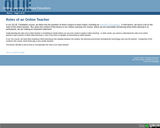
Roles of the Online Teacher

This module was created in response to an observed need by BranchED and the module authors for efforts to increase the recognition, adaptation, and use of open educational resources (OER) among pre- and in-service teachers and the faculty who work in educator preparation programs. The module's purpose is to position teacher educators, teacher candidates and in-service teachers as empowered content creators. By explicitly teaching educators about content that has been licensed for re-use and informing them about their range of options for making their own works available to others, they will gain agency and can make inclusive and equity-minded decisions about curriculum content. The module provides instructional materials, resources, and activities about copyright, fair use, public domain, OER, and visual literacy to provide users with a framework for selecting, modifying, and developing curriculum materials.
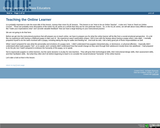
Teaching the Online Learner